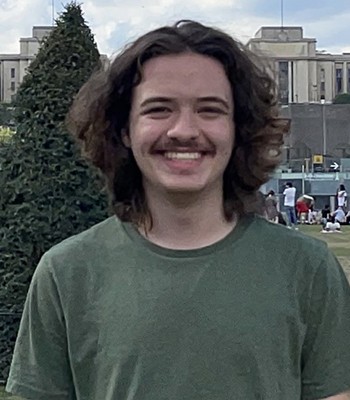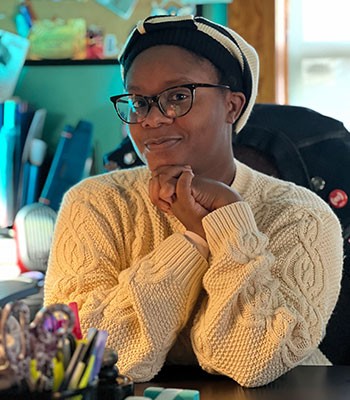Ethan Parks ’24 is the first person in his family to attend college. That didn’t seem like a big deal until he left Fort Worth, Texas, for Gambier.
“It wasn’t an identity that I considered until I got here because everybody that I knew was first-gen,” he said. “Very few of my friends in high school had parents who went to college.”
The son of a teacher and train conductor, Parks found himself on unfamiliar terrain on the Hill — both for himself and his family.
“A lot of times, if you have issues at school and your parents went to college, you can go and talk to your parents,” he said. “There were challenges that I was facing with different things that I didn’t know who to go to because this was the first time I wasn’t able to go to my mom.”

Parks, who serves as the president of the affinity group FiGLi (First-Generation Low-Income Student Organization) — a space where students connect with others, share their experiences, and gain access to knowledge and resources — told his story as part of a panel discussion on Nov. 8 for national First-Generation College Celebration Day.
Joining him were Chloe Ketron ’25, FiGLi vice president; Thomas Hawks, dean for academic advising and support; Don Miller, director of the First Year Experience; and Tatiana Samuel, assistant women’s lacrosse coach — each of them current or former first-generation college students.
“I love bringing people together, and this particular group of folks was very special because they really had a very specific perspective that I think needs to be heard,” said organizer Sasha Pauline Fanny-Holston ’11, assistant director of the Office of Diversity, Equity and Inclusion and a first-gen student.
National First-Generation College Celebration Day, first observed in 2017, is held on Nov. 8 in honor of the signing of the Higher Education Act in 1965 by then-President Lyndon B. Johnson. The federal law is intended to improve access to higher education, regardless of income.
Kenyon uses that legislation to define first-generation college students as those whose parents do not have a four-year college degree or those who only receive support from one parent, who does not have a four-year degree. There are more than 170 such students at Kenyon, according to the Registrar’s Office.
Miller said it’s important for faculty and staff to demystify the college process for both first-generation students and their family members.
“It’s everything from how to navigate what office hours are and working with faculty members to what resources are on campus and how to find that stuff,” he said.
A number of campus initiatives offer support for first-gen students. They include the Kenyon Educational Enrichment Program (KEEP), which introduces first-year students to the College before orientation with an intensive academic experience over the summer and offers other support, and the peer mentoring program known as Recognizing Each Other’s Ability to Conquer the Hill (REACH).
There also are student organizations such as FiGLi and the Student Success Fund, which provides financial assistance to students with an unexpected need related to course supplies, graduate school applications, interview attire, medical and emergency expenses, and everyday needs

First-generation college students can face a number of challenges, including imposter syndrome. Miller said students can be empowered when they seek out mentors from among others who were once in their shoes — faculty, staff or even upperclassmen leaders like Parks.
“We are here for the students,” Fanny-Holston said. “Students need to see people like me, people like Don and Tom and Tatiana. They need to see people who have made it because that is the biggest thing — if they can see it, then they can emulate it.”
Parks said he was pleased with the event and how it showed that you can be a first-generation college student at Kenyon. He said such students should feel empowered to seek community in each other and “let other students know that you’re not necessarily alone in your identity.”